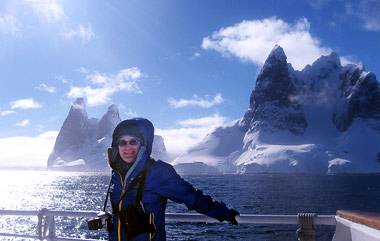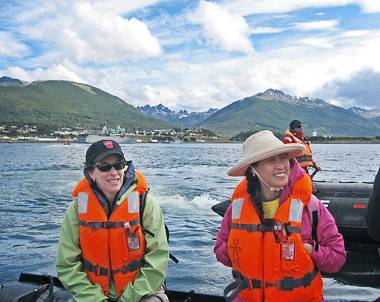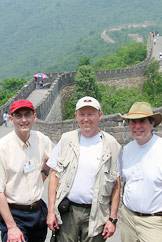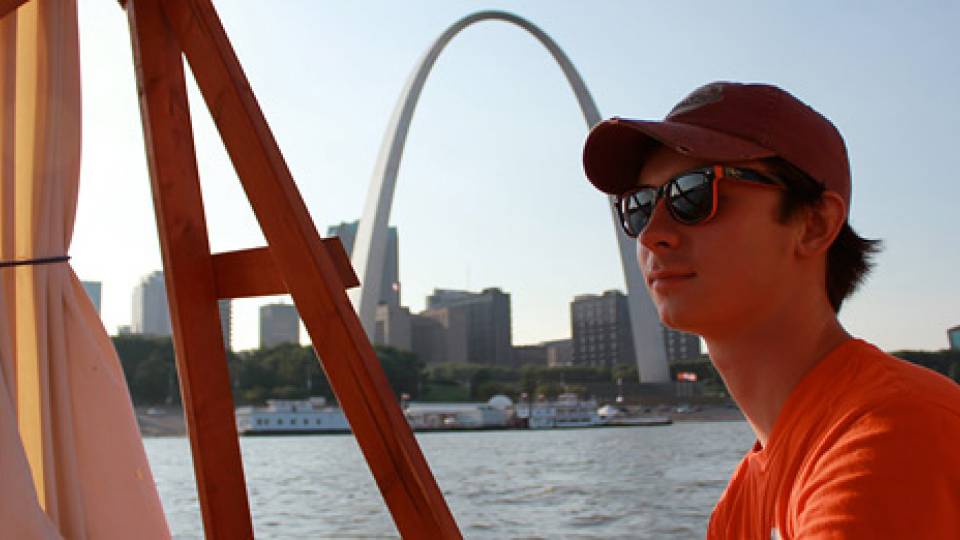Faculty connect with alumni through travel study program
From the March 30, 2009, Princeton Weekly Bulletin
Princeton professors often make minor adjustments to courses' reading lists or lectures mid-semester, but those who bring their lessons on the road through the Princeton Journeys alumni education program learn to make contingencies for bigger hurdles -- from severe weather to government roadblocks.
Constanze Güthenke, an assistant professor of classics, was serving as a study leader on a 10-day cruise in the Aegean Sea last year when the group had to change course due to high winds, also shifting the port cities in which they stopped.
"This was taken by the travelers with a great deal of willingness and a general sense of adventure -- being beaten off path is after all, if nothing else, very Odyssean, maybe minus the assorted sea monsters," she said.
Working with independent tour operators, the Princeton Journeys program offers about 20 educational trips a year to Princeton alumni and their families to destinations around the globe, covering topics from geology to history to literature. Each trip includes a study leader, typically a Princeton faculty member or an alumnus who is a subject matter expert at another institution, who is asked to prepare three or four formal presentations. Faculty participants find that the opportunity to travel and connect with different generations of students comes with some unique challenges and some unexpected highlights.
The Journeys program is part of the Alumni Education Program of the Alumni Association, whose staff members survey the Princeton faculty annually to identify new study leaders and to solicit ideas for new travel programs.
"When a faculty member agrees to lead one of our programs, he or she is typically very excited by the prospect of visiting a certain location -- often central to his or her research interests -- with engaged adult learners. There is usually at least one site along the itinerary that he or she has not visited but has always wanted to see, so that can be an enticement, too," said Leslie Rowley, associate director for alumni education.

Ecologist and wildlife expert David Wilcove suggested a Princeton Journeys trip to Antarctica to study one of the world's most imperiled ecosystems. "I thought it would be a great way to reach out to our alumni and offer them the chance to learn about critical conservation issues," said Wilcove, a professor of ecology and evolutionary biology and public affairs. (Photo: Andrew Gossen)
Ecologist and wildlife expert David Wilcove approached the Journeys staff about organizing a series of trips to the most imperiled ecosystems in the world, which resulted in a two-week voyage to Antarctica in December. Wilcove offered insights from his research to the travelers as they shared close encounters with penguins, humpback whales and glaciers during their study of Antarctica's wildlife and weather.
"I thought it would be a great way to reach out to our alumni and offer them the chance to learn about critical conservation issues," said Wilcove, a professor of ecology and evolutionary biology and public affairs. "The principal challenge, I think, is to make sure that you provide the participants with information and experiences that they could not get on other commercial trips to the same place."
After leading a trip through China last year, religion professor Stephen F. Teiser said that his group could have been disappointed by having to scratch Tibet from their itinerary because their entry permits were denied. Instead, the group's enthusiasm provided him with inspiration, he said. The group took in the history and culture of China, exploring subjects such as opera, the Great Wall, monasteries and modern Shanghai architecture. To replace the Tibet portion of the trip, the group added several stops in China. They visited the town formerly known as Zhongdian, which was renamed Shangri-La in 2001 after the fictional paradise. They also traveled to the city of Lijiang to visit the famed Tiger Leaping Gorge and watch "Lijiang Impression," an outdoor theatrical performance created by China's leading film director, Zhang Yimou, who also produced the opening ceremony for the 2008 Olympics.
"Lecturing onsite, outside the classroom, to intelligent, interested and interesting adults also rekindled my enthusiasm for teaching back in Princeton. That unexpected payoff has influenced how I approach my current lecture course, 'The Religions of China,'" said Teiser, the D.T. Suzuki Professor in Buddhist Studies. "I still teach the history of Buddhism, Confucianism, Daoism and Chinese folk religion, but my work with Princeton Journeys has shown me new ways to present the material so that students take an interest in it. Both alumni and current Princeton students have increasing contacts and experience with China and Chinese culture, so I try to speak to their experience more directly."

While leading a Princeton Journeys rafting expedition down the Colorado River, civil and environmental engineering professor Eric Wood held "class" at the group's camp sites, using posters he created before the trip. (Photo: Imani Joseph)
Planning lessons for unconventional locations can be difficult, said Eric Wood, who led a rafting trip on the Colorado River. Wood, a civil and environmental engineering professor who studies water use in the western United States, had to hold "class" at the group's camp sites as they traveled a 100-mile stretch of the Colorado River in Canyonlands National Park in Utah.
"This was a challenge since there was of course no electricity -- so no PowerPoint -- and no blackboards. I made up large posters that were hung up and we discussed the day's topic," Wood said.
He also had to find ways to make issues of water use interesting and accessible to the trip participants, who varied in age and background.
"They were basically there to enjoy the rafting, so I needed to find the balance between some rigor about climate change and water issues and the vacation aspects of rafting an incredibly beautiful river," Wood said.
To achieve the right balance for the lessons, some faculty assign readings or other homework, while others prefer encouraging discussion among travelers by using the preceptorial model, Rowley said.
"Some professors are more interested in having individual conversations about their research in more casual settings, perhaps over a drink or a meal," she added.

For a two-week tour of Patagonia, Assistant Professor of Geosciences Nadine McQuarrie (left) prepared detailed lessons about the geologic and tectonic structure of the region for alumni travelers such as Mary Yang (right). (Photo: Andrew Gossen)
Assistant Professor of Geosciences Nadine McQuarrie, who studies the evolution of mountain belts, struggled to find the right tone for her lessons during a two-week tour of Patagonia in 2007. Though she prepared detailed lessons, she said she didn't know whether the travelers would want to know about the geology of the Andes or to simply take in the amazing scenery.
The travelers, she said, "ended up being really inquisitive and asking great questions. I really enjoyed the conversations we had regardless of what the conversation was about."
Lou Tucciarone, a 1979 alumnus who has taken two more Journeys trips since accompanying McQuarrie on the Patagonia trip, said he could tell she had put a lot of thought into the material she presented, as well as the reading list provided before the trip.
"The lectures were chock full of substance, but she did not assume we had much prior knowledge. They were challenging to follow but rewarding," said Tucciarone, who studied civil engineering at Princeton and is now a senior vice president at URS Corp., an engineering and construction firm. He said the lectures and informal discussions -- over meals and on hikes or bus rides -- "made for a first-rate educational experience. It was an extended field trip."
Many professors said they found the trips much more stimulating than they expected, both socially and intellectually.
Güthenke, who accompanied the trip through the Greek isles, expanded her lessons from the advertised topic of classical Greece to include material on contemporary Greece, and her "students" responded with curiosity.
"They have a few decades more living experience, and they brought it, which was a wonderful addition. They did the readings (which undergrads do, too), and they were not ashamed to ask questions. What is more, there was time, of which there is never enough in Princeton," Güthenke said. "We got to talk and no one was watching the clock."





